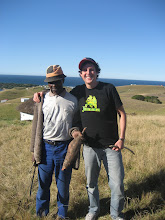We do however have a great deal of qualitative data: Discussions with IV drug users that have administered narcan, show that the drug overdose prevention trainings we provide have saved numerous lives. The transgender-specific care we offer, including assistance with injecting hormones, has prevented deaths and serious injury that would have resulted from use of hormones on the black market.
In other words, while many of the harm reduction approaches we employ may be difficult to analyze quantitatively, we certainly see qualitative evidence to support these approaches.
On the other hand, there are certain initiatives that might require more evidence to show their efficacy: HIV testing in the urgent care clinic has been useful in detecting a few unknown positives, but without adequate time for counseling, I wonder if the more frequent HIV negative result is validating risky behavior amongst our patients
